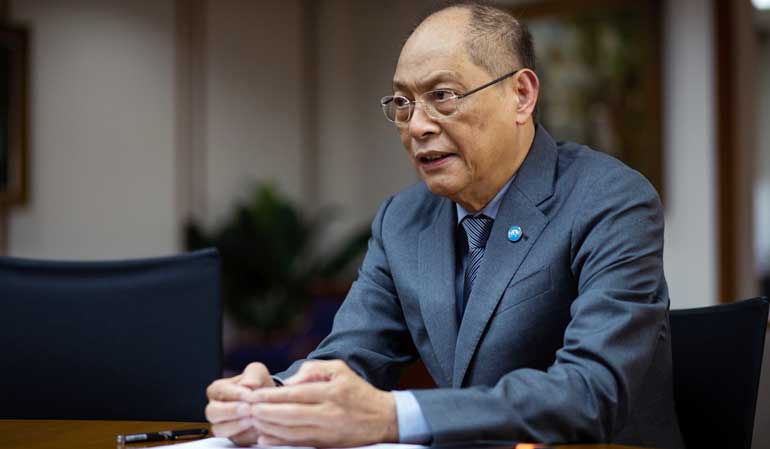
THE central bank may maintain the low interest rate environment in the next two years to provide support to the economy amid uncertainty caused by the coronavirus disease 2019 (COVID-19) pandemic.
“Given that there’s a lot of uncertainty still in the air, we are committed to a long-term low inflation regime…. To me, that is what we intend to do. What we have done will be on the table for the next, maybe, another two years,” Bangko Sentral ng Pilipinas (BSP) Governor Benjamin E. Diokno said in an interview with ANC News Channel when asked about the country’s interest rate environment by 2023 after the Federal Reserve’s recent signal that US interest rates should be kept at near-zero for at least three years.
Mr. Diokno said central banks have been working on a “disengagement strategy” to give signals that “should not be early nor too late.”
“[B]ecause otherwise it may create more hazard issues where corporations which should not have been supported will continue to rely on the support of the government…,” he said.
The overnight reverse repurchase, lending, and deposit facility are at record lows of 2.25%, 2.75%, and 1.75% after the central bank slashed rates by a total of 175 basis points this year.
Mr. Diokno’s latest statement provides the market with a time-based forward guidance on the BSP’s accommodative policy, said ING Bank N.V. Manila Senior Economist Nicholas Antonio T. Mapa.
“The two-year timeline also highlights the outlook for economic growth with BSP likely expecting the economy to be in need of stimulus all throughout the next two years. We may not be in for a quick recovery.” Mr. Mapa said in an e-mail.
The economy has plunged into recession, with a record 16.5% contraction in the second quarter due to the lockdown.
As the pandemic stretches on, the government expects the GDP to contract this year by 4.5-6.6% before bouncing back with a 6.5% to 7.5% growth next year.
“It is prudent to assume some slow growth in the meantime until a vaccine has been developed, and until the central bank has been successful in restoring confidence — which means we cannot be caught off-guard if situation worsens and I think the BSP has so far been successful in that front,” Security Bank Corp. Chief Economist Robert Dan J. Roces said in a text message.
Mr. Diokno said they have taken a deliberate pause in order to gauge how the market took in the liquidity support from the BSP which is estimated to have reached about P1.4 trillion or equivalent to 7.3% of the country’s gross domestic product (GDP).
The BSP’s Monetary Board will have its next policy-setting meeting on Oct. 1 following the Aug. 20 review where they kept policy rates unchanged.
Also on Monday, Mr. Diokno said the central bank is ready to deploy unconventional tools to support the economy and the government amid the crisis.
“This [unconventional tools] is a one-off or whenever there is a need for it…. But as I keep saying we still have a lot of tools in our arsenal,” Mr. Diokno said.
Mr. Diokno’s statement comes after the enactment of the Bayanihan to Recover as One Act (Bayanihan II) which increases the allowed repurchase agreement of the BSP with the National Government to about P810 billion from the initial ceiling of P540 billion.
“Armed with the access to a war chest with the BSP and soothed by a pickup in revenue collection, we hope the National Government will use these funds to finally bankroll a COVID-19 response that addresses other glaring weaknesses in the economy given that BSP appears to have covered the banking sector pretty well after the flurry of its policy moves,” Mr. Mapa said. — Luz Wendy T. Noble
